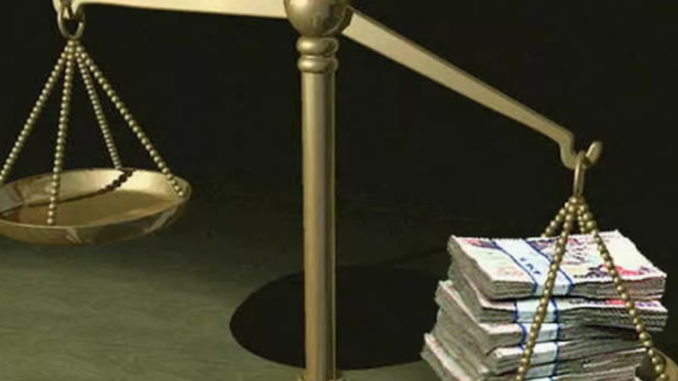
THE report by local and global watchdogs that $15.7 billion is illegally spirited out of the country annually punctures any illusions by the government that it is winning the war on corruption. Findings from a two-year-long project to track illicit financial flows in ECOWAS member-countries show an increase in stolen wealth from Nigeria, despite hyper-activity by anti-graft agencies and this sits oddly with persistent revenue shortfalls, massive borrowing and desperate measures to raise funds. With a total budget size of $33.8 billion for 2020 that is to be partly funded by more borrowing, it is imperative for the government to block the haemorrhage and tame corruption.
Failure to do both is dragging the economy down and entrenching poverty. And fast too: the World Poverty Clock shows that since June 2018, four million more Nigerians have sunk into extreme poverty to bring the total to 91.88 million or 46.5 per cent of the population of 200 million, cementing its position as the world’s poverty capital. This makes news of continued illicit capital flight ever more nauseating and urgent to stop. Undertaken jointly by the Civil Society Legislative Advocacy Centre and Transparency International, the study says that $1 trillion illicitly leaves developing countries annually and out of this, money launderers, taking advantage of the size of Nigeria’s economy, its links to the global economy and “huge amount of dirty assets,” siphon $15.7 billion from the country, to place it in the ranks of the top 10 countries for the criminal freight.
Corruption, as someone famously quipped, is killing Nigeria. The CISLAC/TI report only confirms the reality and underscores how far away from success the anti-graft programme has been. Money laundering still thrives because of weak regulatory mechanisms, collusion by state officials and professionals and particularly weak enforcement. The Central Bank of Nigeria, especially, should note the verdict returned by the United Nations Office on Drugs and Crime that regulators had been unable “or unwilling” to effectively monitor, prevent and contain money laundering perpetrated through financial institutions. This is an indictment that the CBN Governor, Godwin Emefiele, needs to erase by clamping down more strongly on malfeasance within the financial system.
The anti-graft agencies should also take up as a challenge, the World Bank/UNODC finding that successfully resolving 33 “grand corruption” cases from the country would bring back $5 billion, mere change compared to the $582 billion The Economist of London said has been stolen since independence in 1960. About N11 trillion has been swiped through the power sector alone since 1999. Corruption, says the World Bank, continues to undermine policies and programmes aimed at reducing poverty and creating jobs. Fighting corruption, adds Carnegie Foundation, a US non-profit, will go a long way in making the economy gallop. According to the foundation, “Corruption is the single greatest obstacle preventing Nigeria from achieving its enormous potential,” insisting that it weakens the social contract between the government and the people. It suggests adoption of analytical tools for dealing with Nigeria’s “taxonomy of corruption”.
Though it pervades all sectors of the economy and society and corrupts the political and electoral system, NEITI reports that the oil and gas sector is the largest drain pipe, accounting for 92.9 per cent of the $217.7 billion it estimates to have illicitly left the country between 1970 and 2008. Yet, total government debt rose to $81.27 billion by March this year while revenue expectations fell short by N3 trillion in the first nine months of 2018 and debt servicing took N2.2 trillion in 2018, compared to the capital budget of N1.6 trillion.
President Muhammadu Buhari and Emefiele need to step up their game to re-energise the anti-corruption war and cleanse the financial system. Though the President has backed anti-graft agencies, implemented some administrative policies and initiated laws – and Emefiele has lately made headlines combating the financial institutions – Carnegie recommends, first, identifying 20 sectors that are particularly vulnerable to corruption and 28 fraudulent tactics adopted by the corrupt and mapping out appropriate, targeted responses to take them out to achieve success.
One report credits Brazil’s anti-corruption war that resulted in about 200 arrests and over 80 convictions by 2017, with stringent new rules, support for independent prosecutors by the people and media and dogged, impartial prosecution that ensnared two former presidents and a host of high profile political and business figures. Argentina from 2015 onwards, enacted some pieces of legislation that helped put over 90 influential individuals on corruption trials, where, before then, the conviction rate for corruption was 0.0013 per 1,000 cases, said the Buenos Aires Times.
There should be a stronger resolve to enforce the law and stamp out corruption and money laundering. The judiciary needs to log on more convincingly to the assault on corruption, principally by rigorously enforcing the Administration of Criminal Justice Act. Described as “robust, broad and open-textured”, Singapore’s anti-corruption statutory framework features vigorous and impartial enforcement that enabled it to hold the title of the third least corrupt country in TI’s Corruption Perceptions Index 2018 where Nigeria ranked 148.
The CBN should further tighten the noose on errant banks and impose severe sanctions for financial infractions. Corruption is not tamed by rhetoric, but by strong, proactive and punitive actions. There should be no room for sacred cows or exceptions as witnessed serially here. Curbing financial fraud and illicit outflows needs to start from budgeting, monitoring and complying with audit rules. The 65 agencies that the Auditor-General of the Federation said in 2018 had never filed their financial statements for audit purposes need to be compelled to comply with the law.
Buhari and his cabinet should view this task of saving the economy as a national emergency and act accordingly.
END

Be the first to comment